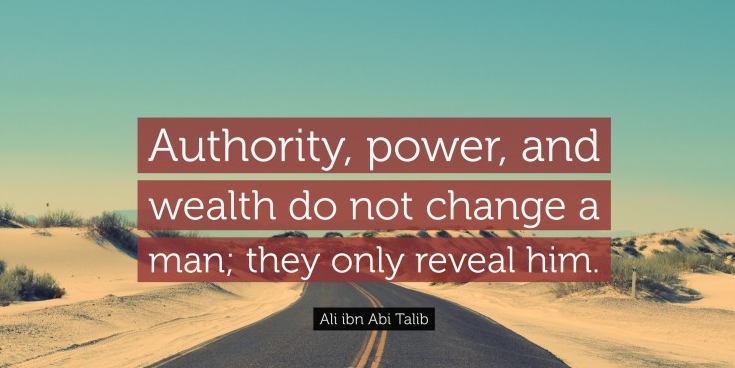Exploring the nature of power, authority, and wealth offers a unique insight into human character and values. When Syedna Ali (RA), a revered figure in Islam and the fourth Caliph, remarked almost 1,400 years ago that these gifts reveal a person’s true nature, he pointed to a timeless truth. He emphasized that the way individuals wield these endowments determines whether they achieve reward or punishment in the eyes of God, as outlined in the Holy Quran and other Islamic teachings. This observation reflects a deep understanding of human behavior, rooted in spirituality and moral responsibility.
The Divine Trial of Power, Authority, and Wealth
In Islam, power, authority, and wealth are often seen as tests from Allah (SAW), challenging individuals to use these resources justly and compassionately. The Holy Quran refers to this world as a place of trial, where every blessing or hardship serves as a test to shape the character of believers. It emphasizes that the ultimate purpose of these tests is to distinguish those who remain humble and conscientious from those who become arrogant and unjust. As the Holy Quran reminds, “And We will surely test you with something of fear and hunger and a loss of wealth and lives and fruits but give good tidings to the patient” (Quran 2:155). Hence, acquiring power and wealth is not the issue—rather, it is how they are wielded those matters.
Power and Authority
The Responsibility to Serve: Power and authority are often accompanied by enormous responsibility. In Islamic teachings, leaders and those in authority are considered shepherds, tasked with protecting, guiding, and ensuring the welfare of those under their care. Syedna Ali’s (RA) words align with this understanding. The true essence of power, as per Islamic philosophy, is rooted in service to others and upholding justice. The Prophet Muhammad (PBUH) is often cited as the epitome of a just and merciful ruler, balancing authority with compassion and humility. His leadership serves as a blueprint for those granted power, emphasizing that it should be used to uplift and protect the weak and marginalized, not for self-gain or exploitation.
In contrast, when authority is exercised with arrogance or a sense of entitlement, it reveals the corruptible side of human nature. Arrogant rulers often prioritize their own interests over the needs of the people, exploiting their position for personal gain or dominance. This behavior, condemned in both the Holy Quran and Hadith, leads to a type of grandiosity that blinds individuals to the temporary nature of their authority. As the Holy Quran warns, “And do not walk upon the earth exultantly. Indeed, you will never tear the earth apart, and you will never reach the mountains in height” (Quran 17:37). This verse reminds us that our perceived power is finite and ultimately accountable to Allah (SWT).
Wealth: A Test of Generosity and Gratitude
Just as with power, wealth is considered a test in Islam. The Holy Quran describes wealth as a “provision” from Allah (SWT), one that must be used responsibly. The measure of wealth is not in its abundance but in how it is spent. A wealthy person has the opportunity to impact society positively, uplifting those in need, investing in the community, and relieving the suffering of the less fortunate. This aligns with the Islamic concept of Sadaqah (voluntary charity) and Zakat (obligatory charity), both of which are intended to circulate wealth and reduce socioeconomic disparities.
However, wealth can easily lead to pride and self-centeredness if not managed within ethical bounds. People who grow obsessed with accumulating wealth often forget their accountability to Allah (SWT) and the community. This obsession leads to materialism, distancing individuals from spiritual growth and deeper values. The Holy Quran warns against this mindset, reminding people of the transitory nature of wealth: “The mutual rivalry for piling up of worldly things diverts you, until you visit the graves” (Quran 102:1-2). The verse serves as a reminder that the accumulation of wealth is meaningless without the conscious effort to use it righteously.
The Dangers of Arrogance and Haughtiness
Syedna Ali’s (RA) insights highlight the dangers of arrogance, haughtiness, and grandiosity associated with power and wealth. These attitudes blind individuals to their moral responsibilities and weaken their connection with Allah. Arrogance, particularly, is seen as a significant spiritual ailment in Islam. It is said that Satan was cast out of heaven due to arrogance, illustrating how destructive this quality can be to an individual’s character.
The Holy Quran repeatedly emphasizes humility as an essential trait of the believers. It urges people to walk on the earth humbly, to recognize the signs of Allah (SWT) in their lives, and to live with awareness of the Day of Judgment, when all worldly distinctions will cease to matter. Power and wealth lose their significance in the face of divine accountability, as it is written, “On that Day, no soul will possess for another soul [the power of] anything, and the [entire] command that Day is for Allah” (Quran 82:19). The idea is to remind those blessed with authority and wealth that their earthly status is temporary, and the true reward lies in how they serve others and their faith.
Accountability: A Core Principle of Islam
The Holy Quran and Hadith reiterate the importance of accountability for every individual, regardless of their status. In Surah Al-Mu’minun, it is stated, “Did you think that We had created you uselessly and that to Us you would not be returned?” (Quran 23:115). This reminder reinforces the concept of accountability, urging believers to act with a sense of purpose and awareness. Islam teaches that everyone, from the wealthiest rulers to the poorest individuals, will stand before Allah (SWT) to answer for their deeds. Power and wealth, rather than privileges, are seen as trials for which individuals must account.
Accountability becomes even more critical for those in positions of authority. As Syedna Ali (RA) highlighted, leaders are not merely elevated above others but are entrusted with greater responsibility. Prophet Muhammad (PBUH) once said, “Each of you is a shepherd, and each of you is responsible for his flock” (Sahih Bukhari). This Hadith underscores that those in power will face a stricter judgment for their actions, as they hold a position that affects many others’ lives.
Embracing Humility and Responsibility
The insights provided by Syedna Ali (RA) over 1,400 years ago remain profoundly relevant in today’s world. His wisdom serves as a guiding principle for those in authority, reminding them that power, authority, and wealth are fleeting gifts. The true character of an individual is revealed through their use of these blessings, determining whether they seek to fulfill their duty to Allah or succumb to the temptations of arrogance and self-importance.
In the pursuit of power and wealth, humility, justice, and compassion must be the cornerstones of one’s conduct. It is through these virtues that one can align their actions with divine teachings and seek the eternal reward promised by Allah (SWT).
By approaching power and wealth with gratitude and a sense of responsibility, individuals can embody the noble character traits that Islam encourages, living not just for their own benefit but for the betterment of society. Syedna Ali’s (RA) words serve as a timeless reminder that, ultimately, we are all accountable for our actions, and our true worth lies in how we serve others and uphold the values of our faith.
(Author besides being a Medical doctor at Mubarak hospital, is a Healthcare policy analyst active in positive perception management of various moral, and social issues. He can be reached at: [email protected])








